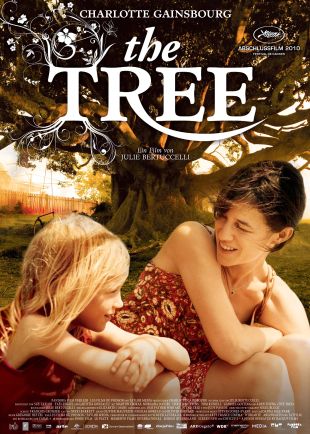
Writer-director Julie Bertuccelli's drama The Tree, an adaptation of Judy Pascoe's novel Our Father Who Art in a Tree, opens with the sudden death of Peter O'Neil (Aden Young), a beloved husband and dad who lives with his wife, Dawn (Charlotte Gainsbourg), and their young children in the Australian countryside. Peter collapses from undisclosed causes behind the wheel of his pickup, which then slowly careens into the base of a Poinciana tree situated next to the family home. In the days to come, grief wracks the family, but eight-year-old daughter Simone (Morgana Davies) finds unexpected solace in the Poinciana's enormous, twisting branches, and claims that she can hear her dad whispering to her from inside of the plant. Though Dawn is initially skeptical, she soon acquiesces and also begins spending time amid the limbs, engaging in deep, thoughtful conversations with the tree.
Taken at face value, the story demands a major suspension of disbelief, but Bertuccelli avoids the pitfall of implausibility by presenting the events metaphorically -- with a scenario where the tree symbolizes Peter's posthumous presence in the family. The material recalls Robert Anderson's observation from +I Never Sang for My Father: "Death ends a life, but it does not end a relationship -- which struggles on in the survivor's mind, toward some resolution, which it may never find." Mirroring this idea, much of the drama in the story revolves around the attempts of the two female survivors to contend, emotionally and psychologically, with Peter's passing -- lured by the intoxicating draw of clinging to the past in the form of hearing Peter's whispers. And when Dawn attempts to build a new life by dating local plumber George Elrick (Marton Csokas), the tree becomes more "aggressive" -- crashing into the master bedroom during a lightning storm, and weaving its roots under the house. In other words, escape from the past isn't always easy -- at times, it seems impossible.

This is all profound stuff, and it benefits a great deal from Bertuccelli's acute observations of her characters. The way the writer-director handles Simone is particularly impressive; from the beginning, the film captures the breadth of the child's imagination, and Simone's ability to live in a dream world almost leads her straight into physical harm -- placing the film in the sphere of such classics as The Spirit of the Beehive, Crows, and I'm Not Scared. Bertuccelli also maps out the contradictory familial emotions that follow a death with something close to perfection.
Unfortunately, though, the picture falters in its last 20 minutes, and its lapse has to do with Dawn's growth. It makes logical sense for Simone to obstreperously hang on to memories of Peter for a longer period of time than her mother, who has more wisdom and emotional strength to draw on by virtue of her age. And it feels credible when Dawn begins to move beyond an attachment to her first husband and into an affair with George -- culling indignation and fury from Simone. What doesn't make sense is for the mother to then kowtow to her eight-year-old by distancing herself from George in an attempt to preserve "the tree." Dawn has already demonstrated how much she grasps the value of moving on and rebuilding her life -- ideas articulated in a gentle lecture to Simone. Having the mother leap backward isn't simply illogical, it's absurd.
.jpg)
This misstep, however, has to be weighed carefully against everything that the film does get right. The material must have seemed fraught with risks from its inception, given its conceit of the father in the tree. In the wrong hands, this concept could easily grow too cute or too precious, or perhaps veer into mystical nonsense. But this never happens; Bertuccelli saves herself and her characters with her quiet and controlled allegorical presentation. And even though the film falls short of its potential with an unsatisfactory resolution, the intelligence of the filmmaker's overall approach does merit a recommendation.
